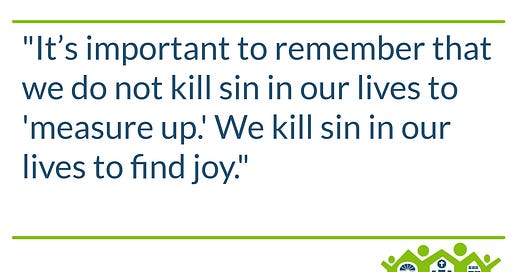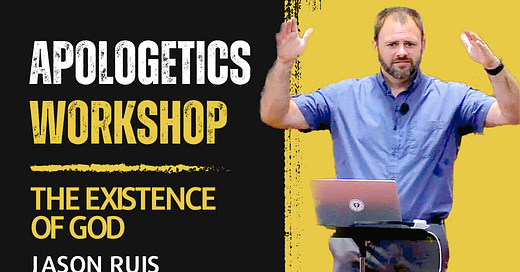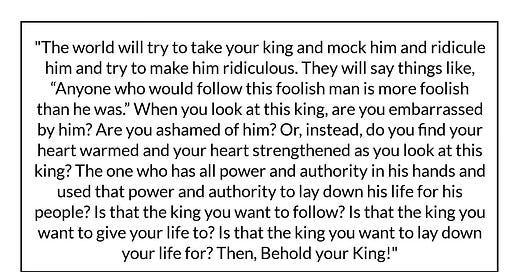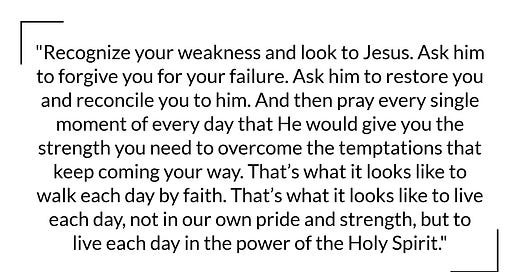
Who Can Find It Out?
[Read Ecclesiastes 7:15-29]
I mentioned before that one of my favorite bands is The Grey Havens. They’re not a popular band, but they should be. As I was preparing my sermon this week, I couldn’t help but think of their song called “Sirens.”
Some of you may know that there is sailing folklore about the “Sirens”—these beautiful women with beautiful voices. Their singing is irresistable. As sailors hear their song, they are entranced and follow their voices with their ship until their ship crashes upon the rocks.
The Grey Havens take that folklore and apply it to sin. Their song says, “One taste of the sound From the sirens in the water And I'm thinking I should get out The sharpest sword and suit of armor So I can be ready to strike But I pause, one more time One last taste of the sound Then I'll cut these sirens down But as they sang, I forgot They were death, so I brought them my heart To be filled, and I followed them … No trace could I find Of any joy the sirens promised They had found a way with a lie To turn what's good and should be wanted Into what is highest above all desires and loves Til my heart would obey Whatever it wants whatever it takes To feel alive and set free Only bound to the sea Where the sirens are leading me on.”
It’s a powerful picture of sin’s temptation. He hears the temptation coming. He knows he needs to prepare for battle to fight it off. Yet, he wants one more taste before he fights it off. And then he’s trapped and enslaved without any real joy.
As our author looks at the world, he recognizes similar temptations: “This only have I found: God created mankind upright, but they have gone in search of many schemes.” (Ecclesiastes 7:29, NIV). God created us good and in His own image. We learn that at the beginning of the Bible in chapter 1 of Genesis. It’s not His fault that we mess up. We are the ones who are constantly seeking out schemes. We are the ones who are constantly tempted by the illusion of sinful pleasure.
Then, as we’re tempted by sinful pleasure, we begin to notice things. The author says, “In this meaningless life of mine I have seen both of these: the righteous perishing in their righteousness, and the wicked living long in their wickedness.” (Ecclesiastes 7:15, NIV). We begin to look around and notice that there are righteous people suffering and wicked people prospering. Why is that? This is the question of the ages, “Why do bad things happen to good people?” This question bothers us. It eats away at us. Then, as it’s gnawing at us, the Sirens begin to sing and tempt us in a couple different directions. Either we give up and give in OR we try harder.
The temptation to give up and give in is very strong. I’ve heard people say things like, “Look, I knew a guy who lived a righteous life. He worked hard to fight off his sin and tempation. Look where that got him. Nothing. He had nothing and died early.” OR they say, “I know a guy who didn’t care what anyone thought. He took advantage of people. He lied, cheated, and stole. He ended up living for a long time and had lots of stuff. Things seemed to work out for him.” So, they fall into the temptation that it’s not worth fighting off sin. They give up the fight and give into sin, thinking it’s better than fighting for no benefit.
Yet, the author of Ecclesiastes gives a few warnings to this temptation. On a practical level he says, “Do not be overwicked, and do not be a fool— why die before your time?…Wisdom makes one wise person more powerful than ten rulers in a city.” (Ecclesiastes 7:17, 19; NIV). At a certain level, we know that stupid doesn’t work. We also know that those who have given themselves to sin typically die sooner. Sure, there are exceptions to those rules. But these things are generally true. So, why die before your time by being dumb and giving yourself to sin?
After these practical reasons, the author gives us a more powerful reason not to give in and give up in our battle against sin. He says, “So I turned my mind to understand, to investigate and to search out wisdom and the scheme of things and to understand the stupidity of wickedness and the madness of folly. I find more bitter than death the woman who is a snare, whose heart is a trap and whose hands are chains. The man who pleases God will escape her, but the sinner she will ensnare.” (Ecclesiastes 7:25–26, NIV). Now, he’s not talking about an actual woman. He’s using imagery—like the Sirens from the song.
This imagery has been used throughout the book of Proverbs. Here’s one example: “Folly is an unruly woman; she is simple and knows nothing. She sits at the door of her house, on a seat at the highest point of the city, calling out to those who pass by, who go straight on their way, “Let all who are simple come to my house!” To those who have no sense she says, “Stolen water is sweet; food eaten in secret is delicious!” But little do they know that the dead are there, that her guests are deep in the realm of the dead.” (Proverbs 9:13–18, NIV).
Here’s why we can’t give in and give up in our fight against sin: it is more bitter than death to be trapped and enslaved by sin. It is a living death, a walking empty joylessness. Yet, the temptation is strong, always pulling us away from God, but it’s also enslaving us and pulling us toward death. To give in and give up in our fight against sin, is not to find true joy. It is settling for a life where you will be empty, enslaved, and beaten every day of your life.
But there’s another temptation that comes when we look at the world, particularly when we see righteous people suffering. Some look at righteous people suffering and say, “I guess I need to try harder and work harder. If I’m going make sure I don’t end up like them, I need to be even more righteous.”
I had this experience as God was renewing my faith. I read a book called, “Crazy Love” by Francis Chan. The book was about how we’re called to have a life—and a love—that the world sees as crazy. It spoke about how much of the church had become apathetic and weak. It challenged me to challenge myself in my faith. So, since I’m not the type of person to do anything “halfway,” I dove in with both feet. I started an intense Bible reading plan—10 chapters a day. I decided to do a 30 day fast. I decided I was going to to be the craziest, most righteous person I knew.
Now, I have to say that God DID use some of these things to grow my faith in powerful ways. However, it wasn’t good. I was crushed under this burden to perform—to prove myself to God and my neighbors. In my passionate desire to be righteous, I was trying to create my own righteousness—I became self-righteous. It was crushing and eventually stole my joy.
In response to this, the author says something that makes Christians squirm a little bit. He says, “Do not be overrighteous, neither be overwise— why destroy yourself?” (Ecclesiastes 7:16, NIV). Do you see how that would make Christians squirm a bit? Well, he’s NOT saying that we should be a little sinful and a little foolish. That’s NOT what he’s saying. He’s warning against the temptation to be “overrighteous”—the temptation of the Pharisees. He’s warning us of the temptation to try to preserve our life through our own efforts. OR the temptation to impress everyone with our righteousness. Why destroy yourself?
He also reminds us of a powerful truth: “Indeed, there is no one on earth who is righteous, no one who does what is right and never sins.” (Ecclesiastes 7:20, NIV). So, you may be trying to put on show so that everyone would think you are righteous—maybe even fooling yourself—but the reality is it’s only a show. No one is righteous. Not even ONE. And, when you try to be overrighteous, you are forced to be a hypocrite and to fake your own righteousness because you are attempting something that cannot be done. The end result will be the same as giving in and giving up. On the outside you may look good, but on the inside you will be empty and joyless and enslaved to sin.
So, what do we do? The author says, “It is good that you should take hold of this, and from that withhold not your hand, for the one who fears God shall come out from both of them.” (Ecclesiastes 7:18, ESV). The “this” and “that” he’s talking about are the two temptations. He says that the one who fears God will come out from under BOTH temptations. This is his point. It’s not about giving into sin and wickedness, it’s about fearing God and following Him. It’s not about trying to put on an external show of righteousness and wisdom, it’s about actually fearing God and following Him. That’s the point. Keep your eyes on God. Fear Him and Follow Him.
He also says this is the pathway of escape when we’ve been trapped and enslaved. He says, “He who pleases God escapes her, but the sinner is taken by her.” (Ecclesiastes 7:26, ESV). This is how you escape when you’ve been taken in by sin and enslaved. You repent, fear God, and follow Him. It’s really that simple. Ask forgiveness, ask for strength to turn away, fear God, and follow Him. Then, when you fall into temptation again, you do it all over again. This is how we FIGHT! This is how we escape the slavery of sin that leads to death.
All of this is a reminder of the Gospel’s power. The Gospel frees us from each of these temptations.
In Romans 6, the Apostle Paul writes, “For we know that our old self was crucified with [Christ] so that the body ruled by sin might be done away with, that we should no longer be slaves to sin—” (Romans 6:6, NIV). It’s through Christ’s life, death, and resurrection that we are freed from our slavery to sin. We are freed from the temptation to give in and give up when sin tempts us. We are freed to Fear God and Follow Him.
We’re also freed from the temptation to earn our own righteousness—trying to measure up. The Apostle Paul famously says in Ephesians 2, “For it is by grace you have been saved, through faith—and this is not from yourselves, it is the gift of God—not by works, so that no one can boast.” (Ephesians 2:8–9, NIV). You’re righteousness doens’t come from what you do. You can’t make yourself super-righteous. Your righteousness come to you from Jesus Christ through faith—not by your own works. By faith, your debt has been paid and you no longer have to worry about measuring up. You’ve been freed from that burden. Now, by faith, you are freed to Fear God and Follow Him.
Finally, the Gospel empowers us to kill sin in our lives. In Romans 8 it says, “For if you live according to the flesh, you will die; but if by the Spirit you put to death the misdeeds of the body, you will live.” (Romans 8:13, NIV). Through Christ we have been given the Holy Spirit and the Holy Spirit empowers us to kill sin in our lives. The Spirit empowers us to grab the sharpest sword and suit of armor to fight off temptations when they come.
It’s important to remember that we do not kill sin in our lives to “measure up.” We kill sin in our lives to find joy. Here’s the chorus of the song I shared at the beginning. As he notices temptation grabbing hold of him, enslaving him, notice how he fights. “Hold on Hold on, my heart You once were full and sang of grace Hold on Hold on, my heart You've tasted joy that's more than this.” He fights temptation by remembering the JOY—the true and lasting joy—that comes through the Gospel and through Jesus Christ. This joy is more powerful than the fleeting pleasures of sin that lead to death. It’s a joy that comes when we Fear God and Follow Him by faith.









